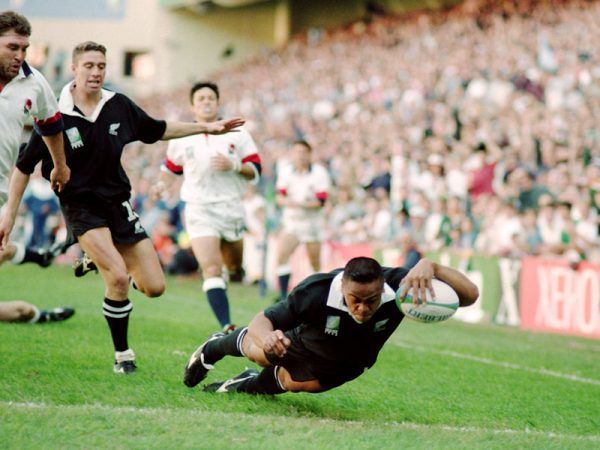Rugby, a dynamic and storied sport, comes with its own lexicon of terms and slang that adds depth and excitement to the game. Whether you're an enthusiastic rugby fan or a newcomer eager to dive into the action, understanding the language of rugby is essential. In this comprehensive guide, we will delve into the world of rugby vocabulary, ensuring you become proficient in the terms and slang commonly used in this sport.
The Fundamentals of Rugby Terms and Positions
Before we explore the colorful realm of rugby slang, it's crucial to have a solid understanding of the basic positions and terminology. Here's an essential overview of the primary rugby positions:
Forwards: Comprising the prop, hooker, lock, flanker, and number eight, the forwards are the powerhouse of the team, responsible for gaining possession, winning scrums, and creating opportunities.
Backs: Comprising the scrum-half, fly-half, inside center, outside center, and wingers and fullback, the backs are known for their speed and agility and handle the ball during open play.
Scrum: This set piece involves the forwards binding together and contesting for the ball by pushing against the opposing team. It's a crucial aspect of rugby that often determines possession.
Lineout: Another vital set piece where two players from each team compete for the ball, thrown in from the sideline. The lineout is an opportunity for strategic play.
Ruck: Occurs when a tackled player releases the ball on the ground, and players from both teams compete for possession in a contest for the ball.
Maul: Similar to a ruck but with a crucial difference; the ball is held by a player on their feet, allowing other players to bind onto that player.
Try: A pivotal scoring play, a try is worth five points and is achieved by a player crossing the opposing team's try line and grounding the ball.
Conversion: Following a try, teams have the opportunity to score two additional points by successfully kicking the ball through the posts. This scoring play is called a conversion.
In-Depth Exploration of Rugby Slang and Lingo
Now, let's embark on an exploration of rugby slang, the colorful language that adds character and uniqueness to the sport. Rugby enthusiasts often employ these expressions to describe various aspects of the game:
Up-and-Under: An up-and-under kick is a high, arcing kick employed for gaining territory or exerting pressure on the opposition. The kicker aims to send the ball high into the air, allowing their team to chase and contest the catch.
Garryowen: This high kick, named after a prominent rugby club in Ireland, is executed near the halfway line to gain territory or put the opposing team under pressure.
Hospital Pass: A pass given to a player just before they get tackled, putting them in a vulnerable position that may lead to injury.
Chicken Wing: A risky one-handed pass often utilized by skillful players to offload the ball in tight situations, resembling the movement of a chicken wing.
Dummy: A player's action of pretending to pass the ball but retaining possession, deceiving the opposition.
Pearler: A term used to describe an exceptionally well-executed play or an outstanding performance that stands out.
Garry: A shortened form of "Garryowen," this term refers to a high kick in open play, often used for strategic purposes.
Trundler: A "trundler" is typically a forward player known for their power and consistency rather than speed, often compared to a dependable, steady force on the field.
Regional Rugby Terms
Rugby is a global sport with variations in terminology, depending on the region. Here are some regional rugby terms:
New Zealand - "Ruck and Roll": A humorous term used to describe the fluid and fast-paced style of play in New Zealand, particularly by the All Blacks.
South Africa - "Bokke": A colloquial term for the South African national team, the Springboks.
Australia - "G'Day Scrum": An Australian twist on the traditional term "scrum," reflecting their friendly and welcoming nature.
England - "Up and Under": Often referred to as the "Up and Under" in England, this term is prevalent in describing high kicks.
France - "Le Crunch": A term used to describe the fierce rivalry between France and England in rugby, especially during the Six Nations.
Learning the Language of Rugby
Learning the ins and outs of rugby language is an exciting journey. Here are some expert tips to help you navigate this unique lexicon.
To truly grasp the language of rugby, immerse yourself in its culture. Whether you're watching matches in person or on TV, attending games, or even following the sport closely, immersing yourself in the world of rugby is key to understanding its language.If the opportunity arises, consider getting on the field as a player. Experiencing the game firsthand provides a hands-on approach to learning the language. Playing rugby not only improves your understanding of the sport but also allows you to connect with the language in a physical and experiential way.
Additionally, books, articles, and websites dedicated to rugby are treasure troves of information. Delve into these resources to gain a deeper insight into the terminology and intricacies of rugby's distinctive vocabulary.Joining online forums, social media groups, and local rugby clubs can be incredibly beneficial. Engaging with fellow enthusiasts and players is a fantastic way to learn from those who've been immersed in the rugby world for a while. These communities are known for their welcoming nature and eagerness to share knowledge.
Never hesitate to seek clarification when you come across a term or phrase you don't understand. The rugby community is typically more than willing to help newcomers. Asking questions not only aids your understanding but also fosters a sense of belonging among rugby fans.
Go check out our power ranking of the greatest rugby players of all time.
Conclusion
Mastering the language of rugby is an enjoyable and educational journey. Whether you're an avid fan or a newcomer to the sport, understanding the terms, slang, and nicknames adds a new dimension to your appreciation of rugby. So, embrace the colorful vocabulary of rugby, and don't be afraid to cheer for your team with the right words and expressions during the next match.
Related

June 8th
The All Blacks: Contender for the Greatest Team Ever
In the realm of rugby, greatness is measured not just by trophies and titles but by the enduring legacy, consistency, and sheer dominance that a team exhibits over time.

February 21st
Rugby Royalty: The Greatest Rugby Players of all time
Rugby's rich history is adorned with exceptional athletes whose extraordinary skills, profound influence, and unwavering consistency have etched their names into the sport's annals.

May 10th
The Top 10 Most Remarkable Rugby Moments of All Time
Rugby, a sport of skill, heart, and sheer brilliance, has given us unforgettable moments etched in the annals of its rich history.
